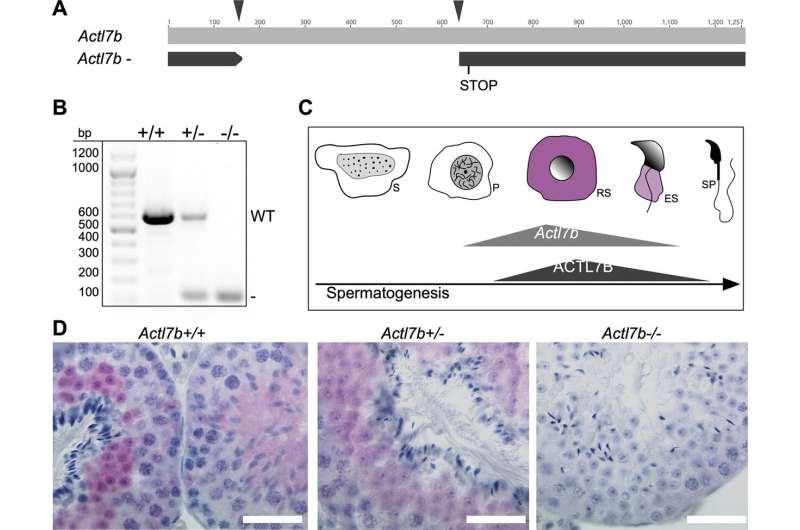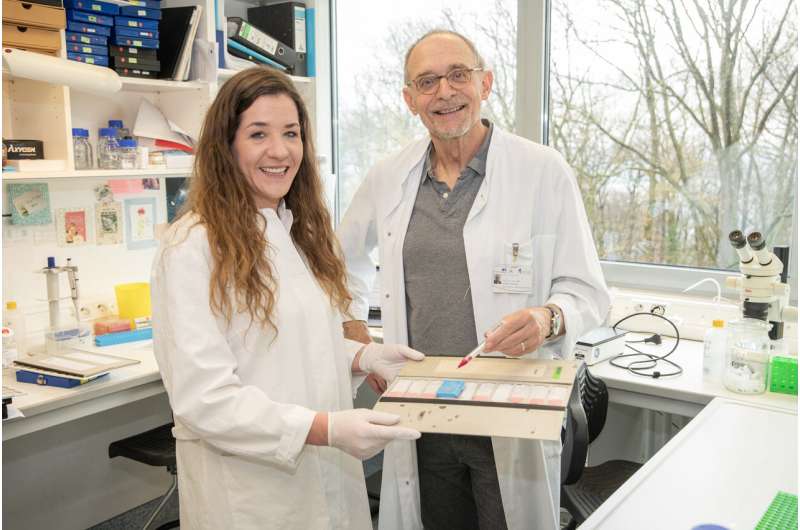This article has been reviewed according to Science X's editorial process and policies. Editors have highlighted the following attributes while ensuring the content's credibility:
fact-checked
peer-reviewed publication
trusted source
proofread
Possible cause of male infertility linked to structural protein

Mature spermatozoa are characterized by a head, midpiece and a long tail for locomotion. Now, researchers from the University Hospital Bonn (UKB) and the Transdisciplinary Research Unit "Life & Health" at the University of Bonn have found that a loss of the structural protein ACTL7B blocks spermatogenesis in male mice. The cells can no longer develop their characteristic shape and remain in a rather round form. The animals are infertile.
The results of the study have now been published in the journal Development.
Male sperm cells are constantly produced in large quantities in the testicles during so-called spermatogenesis. In this process, the typical elongated sperm cells are formed from round germ cells. This enormous change in shape requires the fine tuned reorganization of specialized structural proteins. One of these structural proteins is ACTL7B.
"Since it is exclusively made in humans and mice during the maturation of male sperm, it has been postulated that the protein is important for this phase of development," notes corresponding author Prof. Hubert Schorle from the Institute of Pathology at UKB, who is also a member of the Transdisciplinary Research Area (TRA) "Life & Health" at the University of Bonn.
To investigate the role of the structural protein in spermiogenesis, Prof. Schorle's team generated a mouse model with a mutation in the Actl7b gene using gene-editing technology. This results in a complete loss of function of ACTL7B. "Without ACTL7B, development is blocked, the cells often remain in a roundish shape, usually do not form the elongated, typical sperm shape and die to a large extent," says first author Gina Esther Merges, a doctoral student in Professor Schorle's laboratory.

Disruption in the network of proteins
In this context, the Bonn researchers found that ACTL7B is required for the reorganization of the cytoskeleton of spermatids. Using mass spectrometric analyses, they identified two interaction partners of ACTL7B, DYNLL1 and DYNLL2.
"We were able to show that without the structural protein, DYNLL1 and 2 are not correctly localized in the round spermatids. Since it is probably a larger protein complex with further interaction partners, we attribute the above described effect to a loss of temporally and spatially precisely regulated and targeted redistribution of these proteins," Schorle notes.
This explains why the sperm of male mice with a mutated Actl7b gene is not able to develop the characteristic shape. Due to this, the animals are infertile. In addition, according to other research, there is evidence that levels of the protein ACTL7B are reduced in some fertility patients. "Our study shows that mutations in the Actl7b gene could be the cause of male infertility," says Schorle.
More information: Gina E. Merges et al, Actl7b deficiency leads to mislocalization of LC8 type dynein light chains and disruption of murine spermatogenesis, Development (2023). DOI: 10.1242/dev.201593
Journal information: Development
Provided by University Hospital Bonn




















